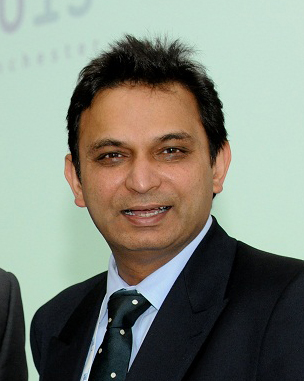
Urology, also known as genitourinary surgery, is the branch of medicine that focuses on surgical and medical diseases of the urinary-tract system and the reproductive organs. Organs under the domain of urology include the kidneys, adrenal glands, ureters, urinary bladder, urethra, and the male reproductive organs.

Earl of Lytton, in the County of Derby, is a title in the Peerage of the United Kingdom. It was created in 1880 for the diplomat and poet Robert Bulwer-Lytton, 2nd Baron Lytton. He was Viceroy of India from 1876 to 1880 and British Ambassador to France from 1887 to 1891. He was made Viscount Knebworth, of Knebworth in the County of Hertford, at the same time he was given the earldom, also in the Peerage of the United Kingdom.
Baron Terrington, of Huddersfield in the County of York, is a title in the Peerage of the United Kingdom. It was created in 1918 for the former Liberal Member of Parliament for Huddersfield, Sir James Woodhouse, Kt. He was succeeded by his eldest son, the second Baron. His wife Vera Woodhouse, Lady Terrington, was one of the first female Members of Parliament. She represented Wycombe as a Liberal from 1923 to 1924. On the second Baron's death the titles passed to his younger brother, the third Baron. He notably served as a Deputy Speaker and Deputy Chairman of Committees in the House of Lords. His son, the fourth Baron, was also Deputy Chairman of Committees in the House of Lords. He had no sons and was succeeded by his younger brother, the fifth Baron. Known as Monty Woodhouse, he was a Conservative politician and an expert on Greek affairs. As of 2016 the titles are held by his eldest son, the sixth Baron, who succeeded in 2001. He is a urologist.

Christopher Montague Woodhouse, 5th Baron Terrington, known as C. M. Woodhouse, was a British Conservative politician who served as Member of Parliament (MP) for Oxford from 1959 to 1966 and again from 1970 to 1974. He was also a visiting Fellow at Nuffield College, Oxford, from 1956 to 1964.

Victor Alexander George Robert Bulwer-Lytton, 2nd Earl of Lytton,, styled Viscount Knebworth from 1880 to 1891, was a British politician and colonial administrator. He served as Governor of Bengal between 1922 and 1927 and was briefly Acting Viceroy of India in 1926. He headed the Lytton Commission for the League of Nations, in 1931–32, producing the Lytton Report which condemned Japanese aggression against China in Manchuria.
Barry O'Donnell was an Irish pediatric surgeon who worked at Our Lady's Hospital for Sick Children, Crumlin in Dublin, who along with Prem Puri pioneered the sub-ureteric Teflon injection (STING) procedure for vesico-ureteric reflux. He was awarded the Urology Medal by the American Academy of Pediatrics, the first pediatric surgeon working outside the US to be so honored.

David Antony Fromanteel Lytton Cobbold, 2nd Baron Cobbold,, was a British hereditary peer and member of the House of Lords.
Henry George Victor John Crichton, 6th Earl Erne, KCVO, was an Anglo-Irish peer and a Lord Lieutenant of Fermanagh. He was known to his family and friends as Harry Erne.
John Henry George Crichton, 5th Earl Erne, briefly styled Viscount Crichton in 1914, was an Anglo-Irish peer, soldier and politician.

John Hartwell Harrison was an American urologic surgeon, professor, and author. He performed the first human organ removal for transplant to another. This was a pivotal undertaking as a member of the medical team that accomplished the world’s first successful kidney transplant. The team conducted its landmark transplant between identical twins in 1954.

Richard Trevor Turner-Warwick was a British urologist who was internationally known for his work on the surgical restoration of the structure and function of the genitourinary tract. He introduced video-cysto-urethrography.
Joseph N. Shapiro was a urologist, military doctor, lecturer and one of the founders of urologic oncology in Russia.
Major James Allen David Woodhouse, 4th Baron Terrington was a Baron in the Peerage of the United Kingdom and Deputy Chairman of Committees in the House of Lords. He was a member of the London Stock Exchange and a director of S J Carr and County (Gunmakers) Ltd. He served in the Royal Norfolk Regiment and Queen's Westminster Rifles and was wounded in World War II.

Prokar Dasgupta is an Indian-born British surgeon and academic who is professor of surgery at the surgical academy at King's Health Partners, London, UK. Since 2002, he has been consultant urologist to Guy's Hospital, and in 2009 became the first professor of robotic surgery and urology at King's, and subsequently the chairman of the King's College-Vattikuti Institute of Robotic Surgery.

John M. Fitzpatrick was an Irish urologist, emeritus professor of surgery at the University College Dublin School of Medicine & Medical Science and Head of Research at the Irish Cancer Society.
Jerry G. Blaivas is an American urologist and senior faculty at the Icahn School of Medicine at Mount Sinai in New York City and adjunct professor of Urology at SUNY Downstate Medical School in Brooklyn, as well as professor of clinical urology at College of Physicians and Surgeons, Columbia University and clinical professor of Urology at Weill Medical College of Cornell University. He has four patents pending, has received four research grants for which he served as the principal investigator, and served as a major in the United States Army assigned to the Walson Army Hospital. He additionally served as president for the Urodynamic Society.
The Honourable Nicholas Michael John Woodhouse is a British mathematician. He is Emeritus Fellow of Wadham College, University of Oxford and former President of the Clay Mathematics Institute.

Terence John MillinFRCSI FRCS LRCP was a British-born Irish urological surgeon, who in 1945, introduced a surgical treatment of benign large prostates using the retropubic prostatectomy, later known as the Millin's prostatectomy, where he approached the prostate from behind the pubic bone and through the prostatic capsule, removing the prostate through the retropubic space and hence avoided cutting into the bladder. It superseded the technique of transvesical prostatectomy used by Peter Freyer, where the prostate was removed through the bladder.

Benjamin James Challacombe is a British consultant urological surgeon at Guy's & St Thomas' Hospitals, and at King’s College London, who specialises in the treatment of kidney and prostatic disease using robotic surgery. In 2005, he was part of the team that published the results of a randomised controlled trial of human versus telerobotics in the field of urology and renal transplant, one of the first of its kind.
Mark Emberton is a urologist and prostate cancer research specialist using novel imaging techniques and minimally invasive treatments to improve diagnosis and treatment of prostate cancer.













